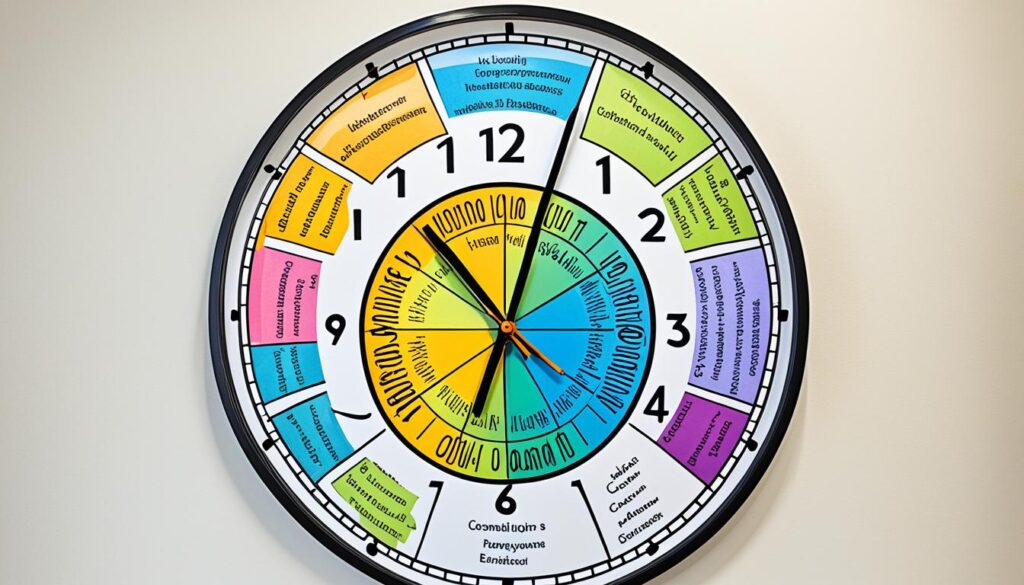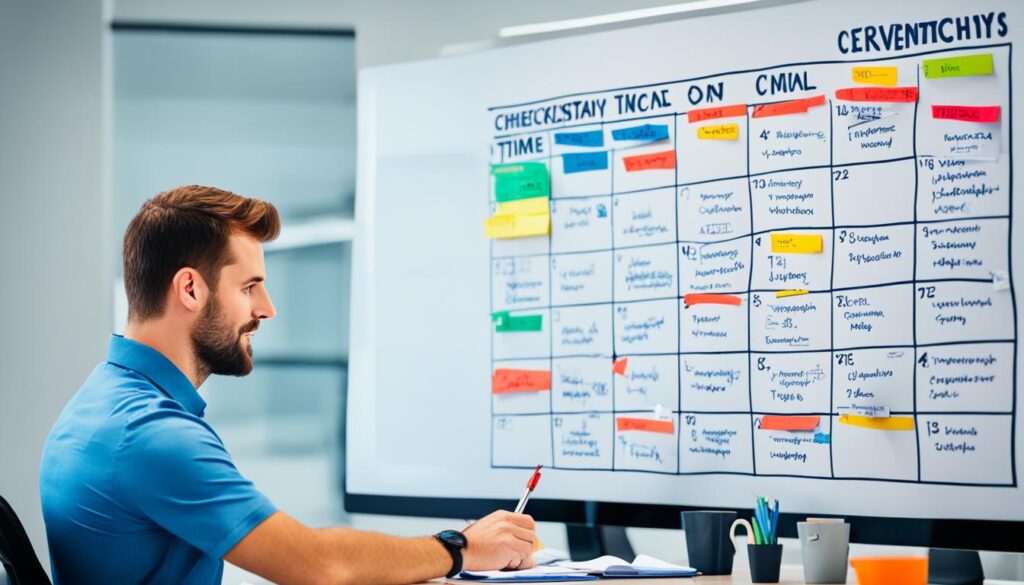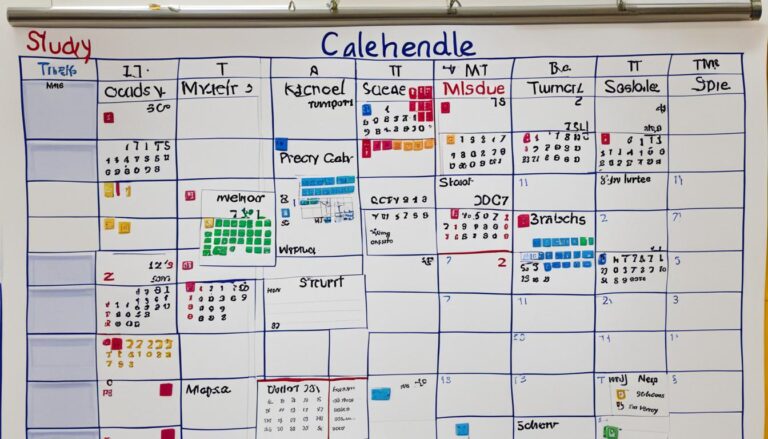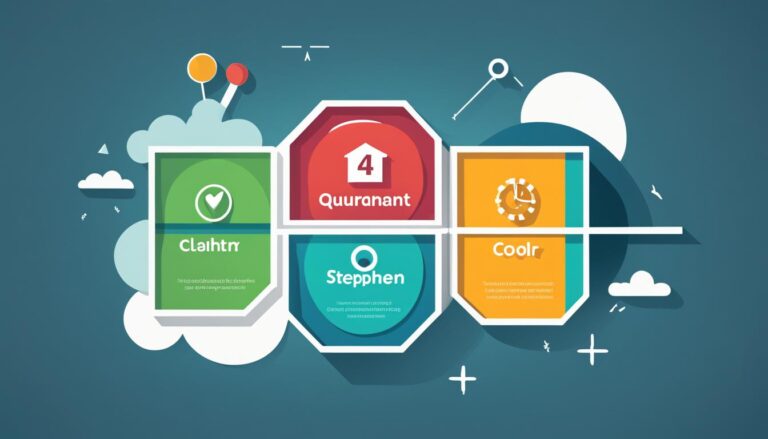Elevate Your Days with Time Management Lesson Plans

Do you often find yourself overwhelmed by countless tasks and deadlines? Are you struggling to find a balance between your personal and professional commitments? It’s time to take charge of your schedule and unlock the key to successful time management.
Introducing time management lesson plans, your ultimate guide to mastering the art of effective time management strategies. These lesson plans offer valuable insights, activities, and techniques that can transform the way you approach your daily routines and responsibilities.
From prioritizing tasks and setting achievable goals to optimizing your productivity and minimizing distractions, these lesson plans provide a structured approach to managing your time effectively. Discover the power of time management and unlock your fullest potential.
Are you ready to seize control of your schedule and achieve more in less time?
Key Takeaways:
- Time management lesson plans are a valuable resource for improving productivity.
- Effective time management strategies can help optimize your daily routines and responsibilities.
- Prioritizing tasks and setting achievable goals are essential aspects of time management.
- By implementing time management activities, you can enhance your productivity and minimize distractions.
- With proper time management skills, you can unlock your full potential and achieve your goals.
The Importance of Time Management Skills for Students
Developing effective time management skills is crucial for students to succeed academically and achieve their goals. By learning how to effectively manage their time, students can improve their organization, increase productivity, reduce stress, and meet deadlines. Implementing time management skills early in life sets a strong foundation for future success. Moreover, utilizing various time management resources can further enhance students’ ability to balance their responsibilities and optimize their academic performance.

Time management resources, such as planners, calendars, and online tools, offer invaluable support to students in their pursuit of effective time management. These resources enable students to stay organized, prioritize tasks, and allocate time efficiently to different academic and extracurricular commitments. Planners and calendars provide a visual representation of students’ schedules, helping them plan their daily activities and allocate time for studying, assignments, projects, and recreational activities. Online tools offer additional convenience, allowing students to set reminders, create to-do lists, and sync their schedules across multiple devices.
By incorporating these time management resources into their daily routines, students can track their progress, stay on top of deadlines, and avoid last-minute cramming. Moreover, these resources promote better time management habits and instill discipline, empowering students to take ownership of their time and make the most of it.
Benefits of Time Management Skills for Students
- Improved organization and structure in academic tasks.
- Increased productivity and efficiency in completing assignments and projects.
- Reduced stress levels as students have a clearer understanding of their priorities and deadlines.
- Enhanced ability to meet deadlines and avoid procrastination.
- Creation of a healthy work-life balance, enabling students to allocate time for personal activities and social interactions.
- Development of essential life skills that extend beyond the academic setting, such as self-discipline, goal setting, and time management.
By cultivating time management skills and utilizing the available resources, students can optimize their academic performance, free up time for other interests, and ensure a balanced and fulfilling student experience.
Time Management Resources for Students
| Resource | Description |
|---|---|
| Planners | Physical or digital tools that allow students to organize their schedules, prioritize tasks, and set reminders. |
| Calendars | Tools for visualizing students’ schedules, enabling them to plan their time effectively. |
| Online apps | Web-based or mobile applications that offer features such as to-do lists, reminders, and synchronization of schedules across devices. |
| Task management tools | Software or apps that help students keep track of their assignments, deadlines, and progress on projects. |
These time management resources provide students with the tools they need to effectively manage their time, stay organized, and accomplish their academic and personal goals. By incorporating these resources into their daily routines, students can develop lifelong time management habits that will serve them well beyond their student years.
Tools and Techniques for Effective Time Management
Enhancing your time management skills is crucial for maximizing productivity and achieving your goals. Fortunately, there are various techniques and tools available to help you take control of your time and make the most of it.
Popular Time Management Techniques
When it comes to managing your time effectively, incorporating proven techniques can make a significant difference. Two popular techniques that you can try are:
- Eat That Frog! Method: This technique encourages you to prioritize tasks and tackle the most important and challenging one first. By completing your most pressing task, you’ll feel a sense of accomplishment and momentum that can fuel your productivity throughout the day.
- 80/20 Rule: Also known as the Pareto Principle, this rule suggests that 20% of your activities will yield 80% of the results. Identify the key tasks and activities that contribute the most to your goals and focus your energy and time on them.
Time Management Tools
In addition to utilizing effective techniques, leveraging the right tools can streamline your time management efforts and keep you on track. Here are some essential time management tools:
- Productivity Apps: Install productivity apps on your smartphone or computer to keep track of your tasks, set reminders, and manage your schedule.
- Timers: Use timers to allocate specific amounts of time for each task and maintain focus during work sessions. It helps break down your day into manageable segments and prevents time-wasting.
- Project Management Software: If you have multiple projects or tasks to manage, project management software can help you prioritize tasks, collaborate with team members, and track your progress.
By incorporating these time management techniques and leveraging the right tools, you can enhance your productivity, improve your efficiency, and achieve your goals with greater ease.

| Technique/Tool | Description |
|---|---|
| Eat That Frog! Method | Prioritize tasks and tackle the most important and challenging one first. |
| 80/20 Rule | Focusing on the tasks that bring the most significant results. |
| Productivity Apps | Install apps to manage tasks, reminders, and schedules. |
| Timers | Allocate specific amounts of time for tasks and maintain focus. |
| Project Management Software | Track, prioritize, and collaborate on projects efficiently. |
Time Management Activities to Boost Productivity
Engaging in time management activities can significantly improve productivity and help you make the most of your time. These activities range from simple exercises to more interactive tasks, all designed to optimize your time management skills and enhance your efficiency. By actively participating in these activities, you can develop discipline, enhance your decision-making abilities, and unlock your full potential.
1. Prioritize Tasks
One of the fundamental time management exercises is learning to prioritize your tasks. Start by listing all your pending tasks or projects and then arrange them in order of importance. By assigning priorities, you ensure that you allocate your time effectively and tackle the most crucial tasks first. This not only increases your productivity but also reduces stress and helps you meet deadlines.
2. Create a To-Do List
A to-do list is a powerful tool for organizing your daily activities. Before starting your day or week, take a few minutes to jot down the tasks you need to accomplish. Make sure to break down larger tasks into smaller, manageable steps. Having a clear to-do list not only keeps you focused but also provides a sense of accomplishment as you tick off completed tasks.
3. Time-Tracking
Consider tracking how you spend your time throughout the day. This activity helps you identify time-wasting habits and allows you to make adjustments to better utilize your time. Use a time-tracking app or simply record your activities in a notebook. By gaining insights into where your time goes, you can eliminate distractions, improve focus, and allocate time to activities that bring you closer to your goals.
4. Evaluate Time-Wasting Habits
Take a moment to reflect on the habits that consume a significant portion of your time but provide little value. Common time-wasting habits include excessive social media scrolling, unnecessary multitasking, or spending excessive time on low-priority tasks. Becoming aware of these habits enables you to make intentional changes and redirect your focus towards more productive activities.
5. Pomodoro Technique
The Pomodoro Technique is a popular time management technique that enhances concentration and productivity. It involves breaking your work into 25-minute intervals, called “pomodoros,” followed by a short break. After completing four pomodoros, take a longer break. This technique helps maintain focus, prevents burnout, and boosts overall productivity.
By incorporating these time management activities into your daily routine, you can optimize your time, increase productivity, and achieve your goals more efficiently.

| Activity | Benefits |
|---|---|
| Prioritize Tasks | – Ensures focus on important tasks – Reduces stress and improves time allocation |
| Create a To-Do List | – Provides clarity and organization – Boosts motivation and sense of accomplishment |
| Time-Tracking | – Helps identify time-wasting habits – Improves time allocation and focus |
| Evaluate Time-Wasting Habits | – Increases awareness of unproductive habits – Enables intentional behavior change |
| Pomodoro Technique | – Enhances concentration and productivity – Prevents burnout and stress |
The Consequences of Poor Time Management
Poor time management can have profound implications for both your personal and professional life. Failing to effectively manage your time can result in a myriad of negative outcomes that hinder your success and well-being.
Impact on Personal Life:
In your personal life, poor time management can lead to missed deadlines, increased stress levels, and strained relationships. When you don’t allocate your time wisely, you may find yourself scrambling to complete tasks at the last minute, causing added stress and anxiety. Furthermore, constantly falling behind on commitments can strain your relationships, as others may perceive you as unreliable or disorganized.
Effect on Professional Life:
In your professional life, poor time management can have serious repercussions. You may experience a decrease in productivity, as you struggle to prioritize tasks and meet deadlines. This can result in lower quality work and missed opportunities for career advancement. Additionally, the stress and overwhelm caused by poor time management can negatively impact your job satisfaction and overall well-being.
Other Consequences:
Moreover, poor time management can have financial consequences, such as missed bill payments or late fees, as well as missed opportunities for financial growth. Additionally, failing to manage your time effectively can lead to a lack of work-life balance, as you may constantly feel overwhelmed and unable to find time for personal pursuits and self-care.
To mitigate these negative outcomes, it is crucial to recognize the importance of developing effective time management skills and techniques. By honing your time management skills, you can regain control of your schedule, increase your productivity, reduce stress, and improve the quality of your work and personal life.

| Consequences of Poor Time Management | Impact |
|---|---|
| Missed deadlines | Increased stress levels |
| Lower productivity | Decreased quality of work |
| Strained relationships | Missed opportunities |
| Financial consequences | Lack of work-life balance |
Developing Effective Lesson Plans for Time Management
When it comes to teaching time management, developing well-structured and engaging lesson plans is key to ensuring effective learning. These lesson plans should not only outline clear objectives for students but also incorporate teaching and learning activities that promote active participation and understanding. By following a structured lesson plan, educators can effectively teach time management skills, empowering students to manage their time efficiently.
Setting Clear Objectives
Before diving into the lesson content, it’s crucial to establish clearly defined objectives that specify what students need to learn and understand, as well as how they will demonstrate their understanding. Objectives could include concepts such as prioritization, goal setting, and strategies for managing distractions. By articulating these objectives, educators can keep the focus on achieving specific learning outcomes.
Engaging Introductions
To stimulate students’ interest and create an engaging learning experience, lesson plans should incorporate exciting introductions to the topic. This could involve sharing real-life examples of individuals who have successfully applied effective time management strategies or using interactive activities that pique students’ curiosity. By starting the lesson on a captivating note, educators can capture students’ attention and set the stage for meaningful learning.
Interactive Learning Activities
Incorporating interactive learning activities is crucial for reinforcing time management concepts and encouraging students to actively participate in their own learning. These activities could involve group discussions, case studies, role-playing scenarios, or hands-on exercises that simulate time-bound tasks. By providing opportunities for students to apply time management principles in a supportive and interactive environment, educators can enhance their understanding and skill development.
Strategies to Check for Understanding
Interweaving strategies to check for student understanding throughout the lesson plan is vital for assessing comprehension and addressing any misconceptions. These strategies could include formative assessments such as quizzes, short written reflections, or class discussions. By regularly assessing students’ grasp of the lesson content, educators can tailor their instruction to address individual needs and ensure effective learning outcomes.
Developing effective lesson plans for time management is a thoughtful and intentional process. By outlining clear objectives, incorporating engaging introductions and interactive learning activities, and implementing strategies to check for understanding, educators can create a positive and impactful learning experience for their students. Together, let’s equip the next generation with the essential time management skills they need to thrive.
Reflecting on Lesson Plans and Improving Teaching Techniques
As an educator, it is essential to constantly improve and refine your teaching techniques to better meet the needs of your students. Reflecting on your lesson plans and evaluating what worked well and what could have been done differently is a valuable practice that can lead to significant growth and development in your teaching abilities.
By taking the time for reflective teaching, you can gain valuable insights into your teaching methods and identify areas for improvement. This self-reflection allows you to assess the effectiveness of your lesson plans, instructional strategies, and classroom management techniques.
One way to reflect on your lesson plans is to seek feedback from your students. Encourage them to share their thoughts, suggestions, and experiences related to the lessons you have taught. By actively listening to their feedback, you can gain a deeper understanding of their learning needs and identify areas where adjustments to your lesson plans may be necessary.
Another valuable source of feedback can come from peer observation. Collaborating with fellow educators and inviting them to observe your classes can provide fresh perspectives and constructive feedback. Observing how others teach and receiving input from experienced colleagues can help you identify alternative approaches and techniques that may enhance your lesson plans.
Personal reflection is also a critical component of improving teaching techniques. Take time to critically analyze and evaluate your own teaching performance. Consider the outcomes of your lessons, the engagement levels of your students, and the effectiveness of your instructional methods. Honest self-assessment will enable you to identify your strengths and weaknesses, enabling you to make the necessary adjustments to your future lesson plans.
Evaluating and Adjusting Lesson Plans
Once you have gathered feedback and reflected on your teaching techniques, it’s time to make adjustments to your lesson plans. This process involves analyzing the effectiveness of each component of your lesson plan and making strategic changes to maximize student learning experiences.
Here are some key areas to consider when adjusting your lesson plans:
- Objectives: Ensure that your lesson plan objectives align with the desired outcomes and learning goals. Clearly define what you want your students to achieve and understand after each lesson.
- Content: Review the content you deliver in your lessons to ensure it is relevant, accurate, and engaging. Consider incorporating different teaching materials and resources to cater to various learning styles.
- Instructional Strategies: Evaluate the strategies you use to deliver information and engage your students. Explore different methods, such as hands-on activities, group discussions, or multimedia presentations, to enhance student participation and understanding.
- Assessment: Assessments play a vital role in measuring student understanding and progress. Review your assessment methods and ensure they effectively evaluate student learning. Consider incorporating formative assessments throughout your lessons to provide timely feedback and identify areas requiring further instruction.
By continuously reflecting on your teaching techniques, seeking feedback, and making adjustments to your lesson plans, you can create a more effective and engaging learning environment for your students. This commitment to self-improvement not only benefits your students but also contributes to your growth as an educator.
Continuously developing your teaching skills and refining your lesson plans is a journey that enhances your ability to deliver high-quality education. Embrace the power of reflection and adjustment, knowing that your dedication to becoming a better educator will undoubtedly impact the lives of your students.
Conclusion
Time management lesson plans are invaluable tools for anyone looking to enhance their productivity and achieve their goals. By implementing effective time management strategies and engaging in activities specifically designed to improve time management skills, you can take control of your schedule and elevate your daily routines.
With proper time management, you can unlock your full potential and accomplish more in less time. By prioritizing tasks, setting clear goals, and utilizing time management tools and techniques, you can optimize your productivity and make the most of every moment.
By developing lesson plans that focus on student learning objectives and teaching time management skills in a structured and engaging way, educators can empower students with the tools they need for success in academics and beyond. With time management lesson plans, individuals of all ages can develop the discipline and organization necessary to thrive in their personal and professional lives.





